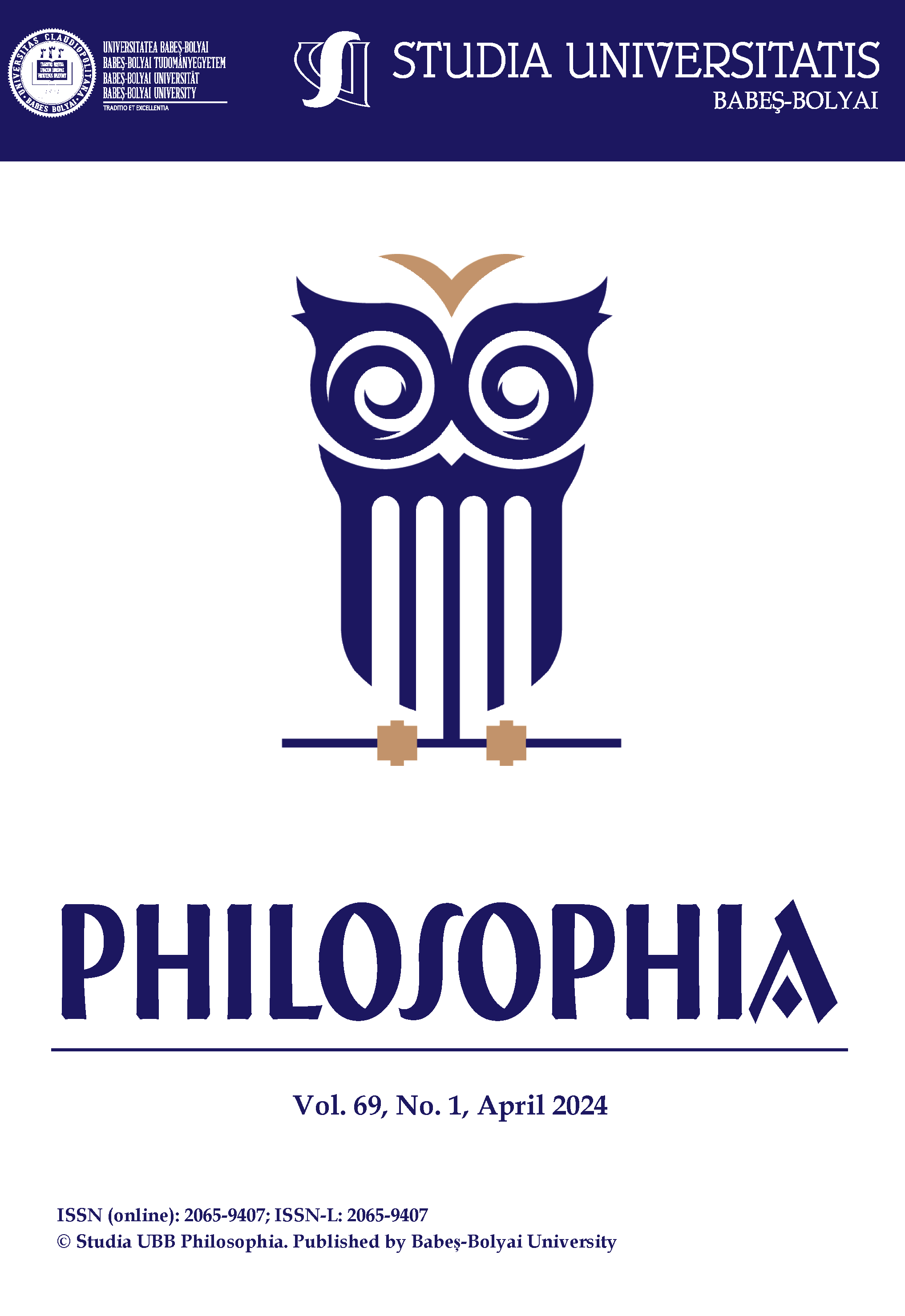Intentionality and Autonomy in Husserl’s Phenomenology: A Comprehensive Analysis of Conscious Decisions and the Transcendental Ego
DOI:
https://doi.org/10.24193/subbphil.2024.1.03Keywords:
Edmund Husserl, Phenomenology, Conscious Decisions, Transcendental Ego, Intentionality, Free Will, Consciousness, Epistemology, Temporality, Rationality, Autonomy, Phenomenological Reduction (Epoché), Intersubjectivity, Self-awareness.Abstract
This essay embarks on a thorough exploration of Edmund Husserl’s seminal contributions to the philosophical discourse on consciousness, with a particular focus on the dynamics of conscious decisions within the framework of phenomenology. By delving into Husserl’s nuanced examination of consciousness—its temporal structure, the nature of self-awareness, and the foundational concept of intentionality—the analysis reveals the intricate ways in which Husserl posits the transcendental ego as the nexus of meaning, judgment, and perception. The discussion illuminates how Husserl’s theory of intentionality and the intentional act’s matter and quality serve as the cornerstone for understanding the will’s engagement with the world. Through a detailed exposition of Husserl’s ideas on the phenomenological reduction, the essay articulates the active role of consciousness in constituting reality and the ethical dimensions underpinning the exercise of free will. The paper argues that Husserl’s insights into conscious decision-making challenge conventional views by framing free will within the contexts of knowledge, ethical deliberation, and the ego’s autonomy. This essay contributes to the ongoing dialogue between phenomenology and contemporary philosophy of mind by highlighting Husserl’s profound impact on our understanding of consciousness, agency, and the existential significance of human decisions.References
Baltzer-Jaray, Kimberly, and Jeff Mitscherling. “The Phenomenological Spring: Husserl and the Göttingen Circle.” In Symposium, vol. 16, no. 2 (2012): 1-19.
Block, Ned. “Consciousness, accessibility, and the mesh between psychology and neuroscience.” Behavioral and brain sciences 30, no. 5-6 (2007): 481-499.
Dainton, Barry. “Temporal Consciousness.” Stanford Encyclopedia of Philosophy (2010).
Damasio, Antonio R. The feeling of what happens: Body and emotion in the making of consciousness. Houghton Mifflin Harcourt, (1999): 104-105.
Dehaene, Stanislas, and Lionel Naccache. “Towards a cognitive neuroscience of consciousness: basic evidence and a workspace framework.” Cognition 79, no. 1-2 (2001): 1-37.
Ferrarello, Susi. “On the rationality of will in James and Husserl.” European Journal of Pragmatism and American Philosophy 2, no. II-1 (2010).
Freeman, Walter J. “Emotion is essential to all intentional behaviors.” Emotion, development, and self-organization: Dynamic systems approaches to emotional development (2000): 209-235.
Giorgi, Amedeo. “Concerning the phenomenological methods of Husserl and Heidegger and their application in psychology.” Collection du cirp 1, no. 1 (2007): 63-78.
Husserl, Edmund. First philosophy: Lectures 1923/24 and related texts from the manuscripts (1920-1925). Vol. 14. Springer (2019).
Husserl, Edmund. Cartesian meditations: An introduction to phenomenology. Springer Science & Business Media (2013).
Husserl, Edmund. Ideas pertaining to a pure phenomenology and to a phenomenological philosophy: First book: General introduction to a pure phenomenology. Vol. 2. Springer Science & Business Media (2012).
Husserl, E. (2000). Logical investigations. London: Routledge Press.
Husserl, E. (1991). On the phenomenology of the consciousness of internal time. Dordrecht: Kluwer Academic Publishers.
Husserl, Edmund. The crisis of European sciences and transcendental phenomenology: An introduction to phenomenological philosophy. Northwestern University Press, (1970).
Lotz, Christian. “Action: Phenomenology of wishing and willing in Husserl and Heidegger.” Husserl Studies 22, no. 2 (2006): 121-135.
Nagel, Thomas. “What is it like to be a bat?.” In The Language and Thought Series, pp. 159-168. Harvard University Press (1980).
Pekala, Ronald J., Jack Steinberg, and V. K. Kumar. “Measurement of phenomenological experience: Phenomenology of Consciousness Inventory.” Perceptual and Motor Skills 63, no. 2 (1986): 983-989.
Prentner, Robert. “Process metaphysics of consciousness.” Open Philosophy 1, no. 1 (2018): 3-13.
Sandmeyer, Bob. “JN Mohanty: Edmund Husserl’s Freiburg Years, 1916–1938: Yale University Press, New Haven, CT, 2011, 512 pp, $85.00, Hardcover, ISBN 978-0-300-15221-0.” Husserl Studies 30 (2014): 71-76.
Seth, Anil K., Zoltán Dienes, Axel Cleeremans, Morten Overgaard, and Luiz Pessoa. “Measuring consciousness: relating behavioural and neurophysiological approaches.” Trends in cognitive sciences 12, no. 8 (2008): 314-321.
Thompson, Evan, and Dan Zahavi. “Philosophical Issues: Phenomenology.” In The Cambridge Handbook of Consciousness, edited by Philip David Zelazo, Morris Moscovitch, and Evan Thompson, 67-89. Cambridge: Cambridge University Press (2007).
Velmans, Max. “An epistemology for the study of consciousness.” The Blackwell companion to consciousness (2017): 769-784.
Welton, Donn. “Husserl and the Japanese.” The Review of Metaphysics (1991): 575-606.
Zahavi, Dan. “The three concepts of consciousness in Logische Untersuchungen.” Husserl Studies 18, no. 1 (2002): 51-64.
Zahavi, Dan. “Inner time-consciousness and pre-reflective self-awareness.” (2003): 157-80.
Zahavi, Dan. Subjectivity and selfhood: Investigating the first-person perspective. MIT Press (2008).
Zahavi, Dan. Husserl’s legacy: Phenomenology, metaphysics, and transcendental philosophy. Oxford University Press (2017).
Downloads
Published
How to Cite
Issue
Section
License
Copyright (c) 2024 Studia Universitatis Babeș-Bolyai Philosophia

This work is licensed under a Creative Commons Attribution-NonCommercial-NoDerivatives 4.0 International License.





